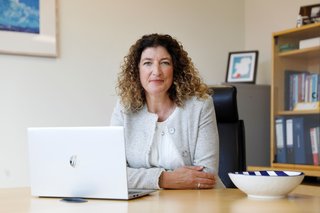
To celebrate International Women’s Day 2024, our Chief Executive, Fiona Murphy, chats about this year’s global theme of inspiring inclusion - what this means to her, what has inspired her, and her ideas about how we can shape a more inclusive service to empower women to choose screening.
“Inclusion is about having a voice at the table that makes decisions, and feeling heard,” says NSS Chief Executive Fiona Murphy.
Experiencing good leadership early on in her career, she says, helped form her understanding of inclusion, when her then manager gave her the space to do her work and the security to know that she could ask for help.
“It gave me such a sense of autonomy and confidence that I could do it and that if needed, the support was there. The level of confidence that your leader or manager can give you is hugely important,” she says.
She experienced inspiring female managers whose qualities – “collaboration, encouragement, appreciation, optimism and a can-do attitude” – she continues to prioritise in her work today. “I admire competence, but I also admire fairness. I want people to feel appreciated and provide the safety for people to do their jobs well.”
Supporting staff inclusion
Having previously worked in the UK’s National Health Service, Fiona says the last three years at the National Screening Service (NSS) has been a learning curve. “I like that there is an emphasis here on how people are treated, as much as on what we do. There is a focus on care and compassion as well as technical and medical expertise, which I like.
“There’s been a huge amount of work in the health service over the last 10 years to help people feel psychologically safe to raise concerns. I think the next step is that people feel safe bringing up ideas and improvements without fear of being rejected.
“I see that level of safety - getting the best out of staff by asking them to bring their ideas to the table and have everyone feel confident that their voice will be valued.”
Building trust and confidence
Fiona speaks of one of the core values of the HSE and NSS – trust – and how important it is to build trusting relationships and foster a culture where people feel safe and believe in each other.
“Trust is an interesting idea in the context of inclusion,” Fiona says. “I have a fairly old-fashioned view of how to build trust – it’s about confidence and competence. I like to demonstrate competence. It’s seeing people do what they say they’re going to do that will build trust.”
Driving patient inclusion
Externally, Fiona explains, the NSS has opened itself to other people’s experiences and views, particularly through the development of the Patient and Public Partnership.
“It’s challenging to have it suggested that what you’re doing could be better, but I think we have increased our confidence in ourselves as an organisation to be able to take that feedback as helpful. It’s data that we can use to make things better for our participants.
“A lot of inclusion happens across the NSS because our first instinct is to ask, ‘what would patients think of this?’, and ‘how can we get patients to tell us?’.
Improving equity
Fiona describes how the NSS puts an equity lens on projects being developed. It’s named in the NSS five-year strategy – Choose Screening, and our equity framework supports this.
“My priority is that people who do or don’t come for screening do it for their own reasons. Screening is an informed choice and some people will choose not to. But if they want to come for screening and they can’t, then it’s our job to help them.
“The people we especially worry about are those who don’t come for screening. We know that for CervicalCheck the 20% of people who don’t come for screening account for 40% of cervical cancers diagnosed and are more likely to get diagnosed at a later stage. There’s always a risk that screening can widen inequality. There’s an onus on us to try and find ways to encourage and support those people to come for screening.”
Fiona doesn’t like the phrase ‘hard to reach’. “It sounds like it’s someone’s fault” she says, “when in reality a working mother trying to get to her cervical screening test has a whole load of barriers to contend with – it’s not her fault. So instead of thinking ‘that woman is hard to reach’ I think ‘how can we make the service more accessible, how can we reduce those barriers?’.”
“I try to put myself in the shoes of somebody who isn’t at the table” Fiona says. “I ask myself, how do we include them? How do we listen better? We know that women are less likely to put themselves first. If I’m a woman in an environment where I don’t feel that my voice is being heard at all, what will help? Inclusion has power when you feel you’re important.”
Inspiring inclusion
For Fiona, inspiring inclusion isn’t solely about increased representation. It’s an action that happens when we personally and collectively embrace trust and compassion; when we have the willingness to interrogate accepted norms; and feel confident enough to seek out and listen to diverse voices.